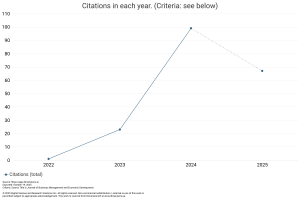How Social Welfare Program, Transparency and Accountability of Rural Funding Management Enhancing the Public Welfare
DOI:
https://doi.org/10.59653/jbmed.v2i01.560Keywords:
Social Walfare Program, Transparancy, Accountability of Rural Funding Management, Family Hope Program, Public WelfareAbstract
Public welfare is a concern that the government continues to resolve. The government has undertaken various efforts to improve public welfare. This research aims to determine the influence of goverment social welfare programs known as family hope program (PKH), transparancy and accountability of rural funding management on public walfare in Gaya Jaya Village, Lawe Sigala Gala District, Southeast Aceh. The population used in this research is the citizens of Gaya Jaya Village, Lawe Sigala-Gala District, Southeast Aceh who obtaining grants from government social walfare program (PKH). The whole population of this research is used as a sample. The number of samples used in this research amounted to 41 respondents. This research data is primary data obtained from research questionnaires, distributed to all respondents. The results of this research show that the goverment social welfare programs, transparency and accountability of rural funding management have positive and significant effect on public walfare in Gaya Jaya Village, Lawe Sigala Gala District, Southeast Aceh. From the results of this research, it is expected that in the next government social welfare program there will be no mistargeting in assisting the public.
Downloads
References
Andreassen, T. A. (2019). Measures of Accountability and Delegated Discretion in Activation Work: Lessons From the Norwegian Labour and Welfare Service. European Journal of Social Work, 22(4), 664–675. https://doi.org/10.1080/13691457.2018.1423548
Apriani, F., & Hani, S. (2016). Faktor-Faktor yang Mempengaruhi Perilaku Wajib Pajak Orang Pribadi Terhadap Penggunaan E-filing. Jurnal Akuntansi Dan Bisnis, 02(01), 83–97.
Apriani, N., Tampubolon, D., & Maulida, Y. (2023). Analisis Pelaksanaan Program Keluarga Harapan (PKH) Dalam Meningkatkan Ekonomi Masyarakat Miskin (Studi Pada Kecamatan Tenayan. … International Journal …, 5(2), 132–138. https://doi.org/DOI: 10.556442
Bauhr, M., & Carlitz, R. (2021). When Does Transparency Improve Public Services? Street-Level Discretion, Information, and Targeting. Public Administration, 99(3), 500–516. https://doi.org/10.1111/padm.12693
Bisogno, M., & Cuadrado-Ballesteros, B. (2021). Budget Transparency and Governance Quality: a Cross-Country Analysis. Public Management Review, 00(00), 1–22. https://doi.org/10.1080/14719037.2021.1916064
BPS. (2023). Profil Kemiskinan Indonesia 2023. https://www.bps.go.id/id/pressrelease/2023/07/17/2016/profil-kemiskinan-di-indonesia-maret-2023.html
Chang, Q., Ma, W., Vatsa, P., & Li, J. (2022). Has the Targeted Poverty Alleviation Program Improved Household Welfare in Rural China? Journal of Policy Modeling, 44(5), 1041–1056. https://doi.org/https://doi.org/10.1016/j.jpolmod.2022.08.005.
Fitrinitia, I. S., & Matsuyuki, M. (2022). Role of social protection in coping strategies for floods in poor households: A case study on the impact of Program Keluarga Harapan on labor households in Indonesia. International Journal of Disaster Risk Reduction, 80(May), 103239. https://doi.org/10.1016/j.ijdrr.2022.103239
Gabriel, A. G., & Castillo, L. C. (2020). Transparency and Accountability Practices of Local Government Units in the Philippines: a Measurement from the Ground. Public Organization Review, 20(3), 437–457. https://doi.org/10.1007/s11115-019-00450-8
Gibran, K., Jaddang, S., & Ardiansyah, M. (2021). Akuntabilitas pengelolaan dana desa dalam upaya meningkatkan kesejahteraan masyarakat desa di kecamatan Jangka. Jurnal Studi Pemerintahan Dan Akuntabilitas, 1(1), 69–82. https://doi.org/10.35912/jastaka.v1i1.291
Hasna, N. M., Nugraha, N., & Mustikarini, I. D. (2019). Analisis Dampak Pemberian Bantuan Program Keluarga Harapan (PKH) Terhadap Kesejahteraan Masyarakat. Citizenship Jurnal Pancasila Dan Kewarganegaraan, 7(2), 108–116. http://e-journal.unipma.ac.id/index.php/citizenship/article/viewFile/5917/2555
Jann, W., & Lægreid, P. (2015). Reforming the Welfare State: Accountability, Management, and Performance. International Journal of Public Administration, 38(13), 941–946. https://doi.org/10.1080/01900692.2015.1069844
Kosack, S., & Fung, A. (2014). Does Transparency Improve Governance? Annual Review of Political Science, 17, 65–87. https://doi.org/10.1146/annurev-polisci-032210-144356
Malbon, E., Carey, G., & Reeders, D. (2019). Mixed accountability within new public governance: The case of a personalized welfare scheme in early implementation. Social Policy and Administration, 53(1), 156–169. https://doi.org/10.1111/spol.12446
Sofyani, H., Riyadh, H. A., & Fahlevi, H. (2020). Improving Service Quality, Accountability and Transparency of Local Government: The Intervening Role of Information Technology Governance. Cogent Business and Management, 7(1). https://doi.org/10.1080/23311975.2020.1735690
Sugiyono. (2015). Metode Penelitian (11 (ed.)). Alfabeta.
Telaumbanua, A., & Ziliwu, N. (2022). Analisis Dampak Pengelolaan Alokasi Dana Desa Terhadap Peningkatan Kesejahteraan Masyarakat. Jurnal Akuntansi, Manajemen Dan Ekonomi, 1(1), 108–123. https://doi.org/10.56248/jamane.v1i1.21
Vian, T. (2020). Anti-corruption, Transparency and Accountability in Health: Concepts, Frameworks, and Approaches. Global Health Action, 13(sup1). https://doi.org/10.1080/16549716.2019.1694744
Vitolla, F., Raimo, N., & Rubino, M. (2020). Board Characteristics and Integrated Reporting Quality: an Agency Theory Perspective. Corporate Social Responsibility and Environmental Management, 27(2), 1152–1163. https://doi.org/10.1002/csr.1879
Downloads
Published
How to Cite
Issue
Section
License
Copyright (c) 2023 Lestarina Simamora, Aditya Amanda Pane, Hasbiana Dalimunthe

This work is licensed under a Creative Commons Attribution-ShareAlike 4.0 International License.
Authors who publish with this journal agree to the following terms:
- Authors retain copyright and grant the journal right of first publication with the work simultaneously licensed under a Creative Commons Attribution-ShareAlike that allows others to share the work with an acknowledgement of the work's authorship and initial publication in this journal.
- Authors are able to enter into separate, additional contractual arrangements for the non-exclusive distribution of the journal's published version of the work (e.g., post it to an institutional repository or publish it in a book), with an acknowledgement of its initial publication in this journal.
- Authors are permitted and encouraged to post their work online (e.g., in institutional repositories or on their website) prior to and during the submission process, as it can lead to productive exchanges, as well as earlier and greater citation of published work (See The Effect of Open Access).





























